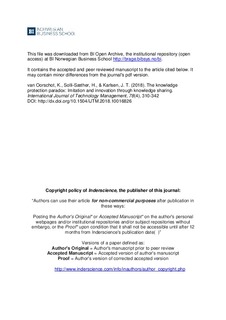The knowledge protection paradox: imitation and innovation through knowledge sharing
Journal article, Peer reviewed
Accepted version
Date
2018Metadata
Show full item recordCollections
- Publikasjoner fra CRIStin - BI [1015]
- Scientific articles [2173]
Original version
International Journal of Technology Management. 2018, 78 (4), 310-342. 10.1504/IJTM.2018.10016826Abstract
Western multinational corporations (MNCs) that want market access in China have to share knowledge with Chinese partners. This may expose them to imitation, so MNCs prefer to protect knowledge resulting in a strategic paradox: MNCs have to both share and protect knowledge. To analyse this paradox, we developed a theoretical conceptual model capturing the tensions and feedback cycles of this paradox. Next, based on data from the shipbuilding industry, a system dynamics model was developed to simulate the long-term effects of sharing and protecting strategies. The results indicate that protection is detrimental to long-term success, because it undercuts the trust of the Chinese supplier and irreparably reduces innovation rates. Knowledge protection thus reduces instead of increases the ability to share (new) knowledge in the future. A sharing strategy increases imitation, but also trust and knowledge sharing by the Chinese partner, such that it enhances the MNC's innovation rate and long-term performance.
